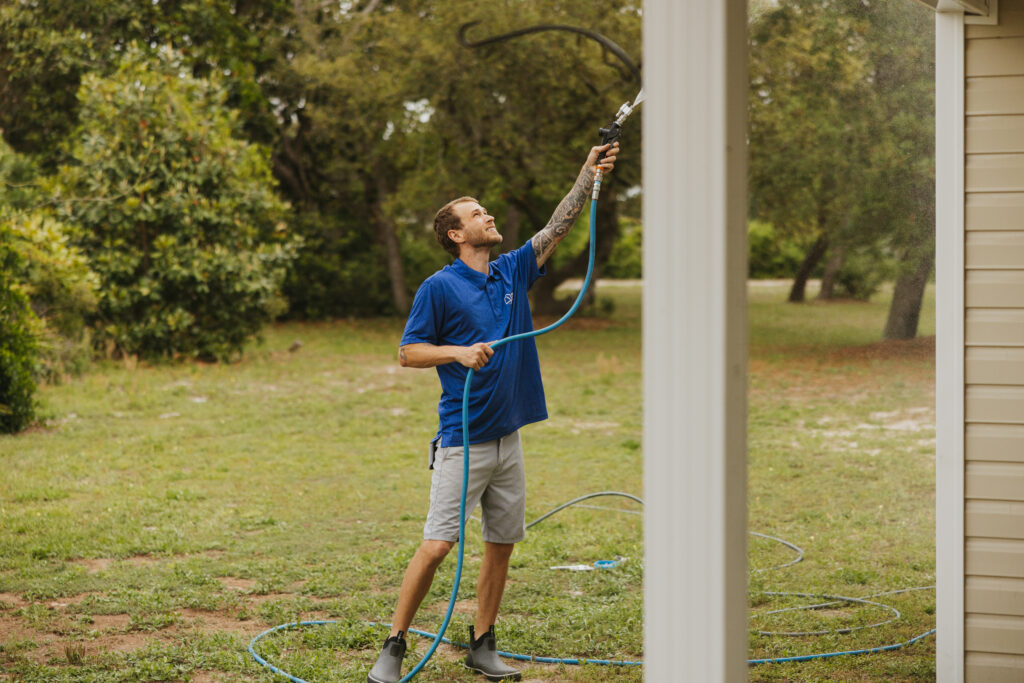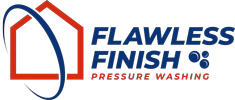What is Soft Washing? A Complete Guide
Maintaining the exterior of your home or business is essential for curb appeal, structural longevity, and overall cleanliness. One effective cleaning method growing in popularity is soft washing. But what exactly is soft washing, and how does it differ from traditional cleaning methods like pressure washing? In this guide, we’ll cover everything you need to know about it, its benefits, and why it might be the ideal solution for your cleaning needs.
What is Soft Washing?
It is a cleaning method that uses low-pressure water combined with specialized cleaning solutions to safely remove dirt, algae, mold, mildew, and other contaminants from exterior surfaces. Unlike pressure washing, which relies on high-powered water jets to scrub surfaces, soft washing focuses on a gentler approach that protects delicate materials while delivering a deep clean.
How Does Soft Washing Work?
It involves three key components:
- Low-Pressure Application: The cleaning solutions are applied using equipment that sprays water at low pressure, typically under 500 PSI. This ensures that the process is safe for fragile surfaces such as roofs, siding, and painted finishes.
- Specialized Cleaning Solutions: These solutions are designed to break down organic growth like mold, algae, and mildew. The chemicals used are biodegradable and eco-friendly, making the process environmentally responsible.
- Time and Rinse: The cleaning solutions are left to sit for a specific period, allowing them to penetrate and eliminate contaminants. Afterward, the surfaces are gently rinsed with water.
Benefits of Soft Washing
- Gentle on Surfaces: It is perfect for cleaning surfaces that could be damaged by high-pressure washing, such as asphalt shingles, vinyl siding, wood paneling, and stucco.
- Long-Lasting Results: By targeting the root causes of stains and grime, like algae and mildew, soft washing prevents regrowth for a longer period compared to traditional cleaning methods.
- Environmentally Friendly: Many soft washing solutions are biodegradable and designed to minimize environmental impact, making it a greener cleaning alternative.
- Improves Aesthetic Appeal: It can make a property look like new by effectively removing stains, streaks, and discoloration.
- Cost-Effective: It often requires less water and fewer repairs in the long run, as it’s less likely to cause surface damage.
Soft Washing vs. Pressure Washing: What’s the Difference?
| Feature | Soft Washing | Pressure Washing |
|---|---|---|
| Water Pressure | Low (under 500 PSI) | High (1,000 – 4,000 PSI) |
| Cleaning Focus | Organic growth and stains | Dirt, grime, and debris |
| Surface Compatibility | Safe for delicate surfaces | Best for durable materials |
| Longevity of Results | Longer-lasting | May require more frequent cleaning |
What Can You Clean with Soft Washing?
It is versatile and can be used on a variety of surfaces, including:
- Roofs: Perfect for removing black streaks caused by algae growth without damaging shingles.
- Siding: Gentle enough for vinyl, wood, and stucco siding.
- Fences: Cleans wood, vinyl, or metal fences without stripping finishes.
- Decks and Patios: Safe for composite or wood materials.
- Outdoor Furniture: Removes stains and grime from outdoor seating and decor.
Is Soft Washing Right for You?
It is ideal for homeowners and businesses looking to restore their property’s appearance without risking damage to surfaces. If your property has visible signs of algae, mold, or mildew, or if you want a thorough clean that lasts longer, soft washing is an excellent choice.
Final Thoughts
It is a powerful yet gentle cleaning method that offers numerous benefits for maintaining your property’s exterior. By using low pressure and specialized solutions, it ensures a deep clean without damaging delicate surfaces. Whether you’re dealing with roof algae, dirty siding, or a discolored fence, soft washing provides a safe, effective, and environmentally friendly solution.

